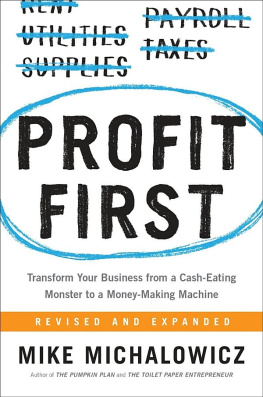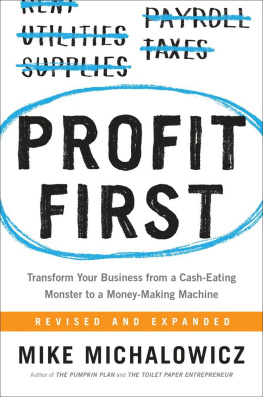Table of Contents
Additional titles inEntrepreneursStartup Series
Start Your Own
Arts and Crafts Business
Automobile Detailing Business
Bar and Club
Bed and Breakfast
Blogging Business
Business on eBay
Car Wash
Child-Care Service
Cleaning Service
Clothing Store and More
Coaching Business
Coin-Operated Laundry
Construction and Contracting Business
Consulting Business
Day Spa and More
e-Business
Event Planning Business
Executive Recruiting Business
Fashion Accessories Business
Florist Shop and Other Floral Businesses
Food Truck Business
Freelance Writing Business and More
Freight Brokerage Business
Gift Basket Service
Grant- Writing Business
Graphic Design Business
Green Business
Hair Salon and Day Spa
Home Inspection Service
Import/Export Business
Information Marketing Business
Kid-Focused Business
Lawn Care or Landscaping Business
Mail Order Business
Medical Claims Billing Service
Net Services Business
Online Education Business
Personal Concierge Service
Personal Training Business
Pet Business and More
Pet-Sitting Business and More
Photography Business
Public Relations Business
Restaurant and More
Retail Business and More
Self-Publishing Business
Seminar Production Business
Senior Services Business
Travel Business and More
Tutoring and Test Prep Business
Vending Business
Wedding Consultant Business
Wholesale Distribution Business
Preface
Theres an old story about the men who drive up to a residential property in an unmarked rusty van, knock on the front door, and inform the homeowner that they can reseal the owners cracked asphalt driveway at only a little more than half the going rate. The homeowner, Mr. Jones, strapped for cash after taking his family on a theme-park vacation, readily agrees to pay cash for the work. The next day, three men arrive bright and early, sweep dirt and leaves off the driveway, and proceed to apply a thin black substance to the driveway. They finish the job quickly and place protective yellow ribbon around the driveway
After packing their tools in the van, they show Mr. Jones the finished project, telling him not to walk or drive on the asphalt for two days in order to give the sealer plenty of time to harden. You dont wanna track the black stuff into your house, they inform him.
Delighted to have saved money and have the job finished quickly, Mr. Jones readily pays cash for the job. Hes so happy with the results, he forgets to get a receipt. The only thing he knows is that the lead mans name is Joe.
Very early the next morning, while Mr. Jones is dreaming about his golf game scheduled for that day, a wild and thunderous rainstorm awakens him and his wife. Trees bend in the storm, small branches break, and their rain gutters overflow. They give up their sleep and plod to the kitchen for their morning coffee.
Mr. Jones steps outside as dawn is breaking to retrieve the morning newspaper that is usually tossed onto his driveway. He takes a few steps and is dumbstruck by what he sees. His driveway is no longer black. The old cracks are still evident and even more prominent because of the rain. But his lawn is black and the gutter along the street is full of black goo. The light bulb goes on as Mr. Jones realizes that he has been taken. The men did not seal his driveway yesterdaythey just painted it with some sort of black liquid.
Weeks later, after paying more than the going rate for a proper sealing job and additional money to have a portion of his lawn reseeded, Mr. Jones comes to the realization that he will either have to give up his weekly game of golf or tell the family that there will be no vacation next summer.
Youve all heard such stories about inept, incompetent, inefficient, and sometimes downright crooked contractors. There are internet websites dedicated to contractor horror stories, TV news magazine shows that highlight unscrupulous contractors, and organizations like the Better Business Bureau that monitor the activities of problem companies.
So in these circumstances, why in the world would anyone want to start his or her own contracting business? Fortunately, the vast majority of contractors are honest, hard-working folks who provide valuable services to the general public. They are talented men and women who have a positive vision of the future and a burning desire to use their talents for the betterment of not only themselves and their families but also for their community and fellow citizens.
Since founding a landscape design/build contracting company in 1976 with my wife, Kathy, Ive learned much about starting and running a contracting business. Most of the learning was fun, but some of the most valuable lessons came from the school of hard knocks where we learned to profit both financially and personally from our mistakes. Our business grew with the help of many talented and dedicated associates and remains a success story to this day. We learned that building a successful business is a true team effortwhether the team consists of just a few people or many dozens.
This book covers many facets of the contracting business: It includes checklists for getting started, ideas on marketing your services, and on how to price these services to make a reasonable profit. It presents ideas for hiring and managing employees and what to do when something goes wrong, either with those employees or with your customers. Along the way well include valuable tips, statistics, and facts about running your own business.
The goal is simple: we want you to know how to start your contracting business and keep it running smoothly, efficiently, and profitably.
The Contracting Industry
The contracting industry is both huge and varied. All sorts of people and companies call themselves contractors. You have heard about Department of Defense contractors who build toilet seats for $600 and sell claw hammers for $450. We know of the hard-working and talented contractors who were instrumental in making the Apollo missions to the moon such a huge success. Some doctors are considered contractors because they sell their services to a particular hospital or clinic, and the same applies to some lawyers.
Stat Fact
According to the Small Business Administration, approximately 6000,000 new businesses are started each year. About half of them survive for five years; only one-quarter are still operating after 15 years.
These are example of the far edges of the contracting industry: huge conglomerates with thousands of employees at one end of the spectrum and the individual specialist on the other end. On one hand, there are large corporations with millions or billions of dollars in assets, often owned by the public through stock offerings traded on a stock exchange, overseen by a large board of directors comprised of experts from many fields, and operated on a daily basis by dozens of highly paid executives and managers. At the other extreme, there is the one person who merely signs a contract with an individual or organization to perform a service. This person may have a partner and may have an executive assistant, but in general, these are very small entities and offer a very specific and limited service.











